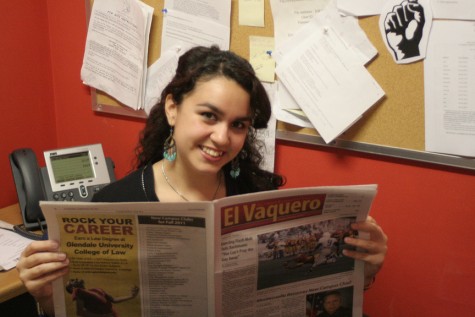More than 100 people crowded Kreider Hall on May 15 to listen to guest speakers Jim Makino and Frank Emi, two Japanese Americans who lived in internment camps during World War II.
The lecture, co-sponsored by the Associated Students (ASGCC) and the Cultural Diversity Program, was held from noon to 1 p.m. and included a question and answer period between the audience and the speakers.
Makino spoke first, discussing what it was like living in the Los Angeles area before World War II.
“My family had a store in San Bernardino,” said Makino. “It was on 1718 N. San Fernando Road. Times were very hard and everyone was looking for something better to do.”
In the 1930s, Makino’s family moved to Alhambra, where his father set up another store. The store was successful until it caught fire and burned down. The Makino family, with support from customers, rebuilt another store.
Makino remembered delivering grocery orders to the home of George S. Patton, the famous army general, who served in both world wars and whose family home was in San Marino.
After the Dec. 7, 1941 attack on Pearl Harbor, Asian-Americans, especially those of Japanese descent, were facing serious racial profiling by the government and racism from non-Asian citizens.
On Feb. 19, 1942, President Franklin D. Roosevelt issued Executive Order 9066, which gave power to the federal government and military to remove any suspicious citizens from coastal areas, and relocate them to internment camps.
“The word came out that we had to move,” said Makino. “Most people had three days to prepare to leave – to where? We had no idea.”
Makino continued, “The internment camps were called ‘assembly centers.’ From Washington to Oregon, to California, were 16 assembly centers.”
During the next three years, more than 120,000 Japanese Americans were seized and sent to the camps.
While Makino’s family remained in the Gila River Relocation Camp in Arizona, he served in the American Armed Forces. He was part of the 442 Regimental Combat Team, which was composed mostly of Japanese Americans.
“We turned out to be the most highly decorated unit of the armed forces, known as the ‘Purple Heart Battalion,’ ” said Makino.
Makino and his unit underwent a rescue mission in which they had to find a lost battalion. When Makino returned with the lost troop, a general asked, “I told you all to be here. Where are your men?”
“All the men weren’t there,” said Makino, “and he wanted to know why we weren’t all there… and I said, ‘Sir, we saved 211 of your Texans [the missing troop].in the hospital. We have over 800 of our men.”
Kreider Hall echoed with the sound of applause as Makino received a standing ovation from the audience.
The next speaker was Emi, co-founder of the Fair Play Committee, a group of internment camp detainees that resisted the draft during World War II.
Emi recalled the injustice that Japanese Americans faced.
“We [the United States] were also at war with Germany and Italy,” said Emi, “but the Germans and the Italians were not similarly treated.”
Emi read loyalty oaths that Japanese Americans had to sign, such as loyalty oath 28, which asked if they would “forswear any form of allegiance or obedience to the Japanese emperor, or any other foreign government, power, or organization.”
“All the rest of the internees just said ‘yes’ and ‘yes’ to the questions,” said Emi, “.in my case, I just answered, ‘Under the current conditions and circumstances, I can not answer these questions.’ ”
Emi then made copies of his answer and distributed the papers around the camp. This was his first action as an activist.
In 1943, while they were in the Heart Mountain camp in Wisconsin, Emi and his friend, Kiyoshi Okamoto, organized the Fair Play Committee.
Emi read an abbreviated version of the committee’s manifesto, which included passages from the Bill of Rights.
“We, the members of the FPC are not afraid to go war – we are not afraid to risk our lives for our country,” said Emi,
“We would gladly sacrifice our lives to protect and uphold the principles and ideals of our country as set forth in the Constitution and the Bill of Rights, for on its inviolability depends the freedom, liberty, justice, and protection of all people including Japanese Americans and all other minority groups.
“But have we been given such freedom, such liberty, such justice, such protection? No. Without any hearings, without due process of law as guaranteed by the Constitution and Bill of Rights, without any charges filed against us, without any evidence of wrongdoing on our part, 110,000 innocent people were kicked out of their homes, literally uprooted from where they have lived for the greater part of their life, and herded like dangerous criminals into concentration camps with barbed wire fences and military police guarding it.”
The audience applauded Emi for his courage and actions that have changed Japanese American history.
Diana Lorenz, ESL-credit instructor, shared a personal memory with the audience and speakers.
“I had the advantage of growing up in a Japanese area during the war,” said Lorenz.”I remember the devastation that Japanese people suffered in their homes.it was awful for people coming back to their homes -things had been stolen, houses had been destroyed and broken. It was a terrible, terrible time.”
Students Suzie Daibyan, 20, undecided major, and Exene Tejano, 19, nursing major, both agreed that the lecture was “a very enlightening experience,” in which they learned a piece of history they didn’t know about before.
For more information on the Cultural Diversity program, contact Kerry Riley at (818) 240-1000, ext. 5768.

